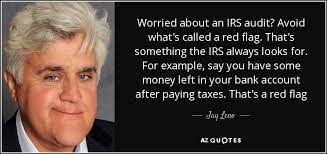Don’t be a Target – IRS Audit Red Flags

My comments are in red and green.
This list was found in a very good article: 15 Reasons You Might Get Audited
- Report a lot of income. (agreed)
- IRS stats for 2014 show that people with incomes of $200,000 or higher had an audit rate of one out of every 37 returns. Incomes of $1,000,000 or higher had an audit rate of one out of every 13 returns.
- Failing to Report All Taxable Income – Schedules B & D and elsewhere (agreed)
- Taking Higher-than-Average Deductions – Schedule A (fuhgeddaboudit, of course you need proof, but generally no problem unless it looks ridiculously out of line)
- Running a Small Business – Schedule C (agreed, somewhat higher audit risk, but not so much when prepared properly by a professional)
- Taking Large Charitable Deductions, in relation to your AGI (agreed)
- Claiming Rental Losses (fuhgeddaboudit)
- Taking an Alimony Deduction (fuhgeddaboudit)
- Writing off a Loss for a Hobby Activity (agreed)
- Deducting Business Meals, Travel and Entertainment (fuhgeddaboudit, of course you need solid proof if selected for an audit)
- Failing to Report a Foreign Bank Account (agreed)
- Claiming 100% Business Use of a Vehicle (fuhgeddaboudit, of course you need solid proof if selected for an audit)
- Claiming Day-Trading Losses on Schedule C (agreed, higher audit risk, but not so much when prepared properly by a professional)
- Gambling: Failing to Report Winnings (agreed) or Claiming Big Losses (fuhgeddaboudit, the IRS knows that the house always wins)
- Claiming the Home Office Deduction (fuhgeddaboudit)
- Engaging in Currency Transactions (the $10,000 currency rules) (agreed)
This list was found in a very good article: A List of 22 Audit Triggers
- Outsized charitable contributions. (agreed)
- Large property contributions. (agreed, generally for items over $5,000)
- Unmatched alimony. (agreed)
- High mortgage interest. (agreed, if it appears the debt exceeds $1,100,000)
- Unreported income. (agreed)
- Gambling losses. (fuhgeddaboudit, the IRS knows that the house always wins)
- Miscellaneous 2% itemized deductions. (fuhgeddaboudit)
- Foreign bank accounts. (fuhgeddaboudit, but make sure you properly report all of these)
- Unreimbursed employee business expenses. (fuhgeddaboudit)
- Cash transactions in excess of $10,000. (agreed)
- Rental losses of a real estate professional. (fuhgeddaboudit, but be prepared to prove you meet the rule)
- Casualty losses. (fuhgeddaboudit, but if selected for audit you need to be very well prepared)
- Bad debt losses. (fuhgeddaboudit)
- Home office. (fuhgeddaboudit)
- Day-trading losses on Schedule C (agreed, higher audit risk, but not so much when prepared properly by a professional)
- Net operating loss. (fuhgeddaboudit, unless carried back 2 years)
- Rental losses. (fuhgeddaboudit)
- Hobby losses (agreed) and also:
- a business return such as a Schedule C, (agreed, somewhat higher audit risk, but not so much when prepared properly by a professional)
- a business return such as a S corporation or LLC (fuhgeddaboudit)
- rental properties. (fuhgeddaboudit)
- Travel and entertainment. (fuhgeddaboudit, of course you need solid proof if selected for an audit)
- Automobile usage. (fuhgeddaboudit, of course you need solid proof if selected for an audit)
- Repairs and maintenance. (fuhgeddaboudit)
- Zero officer salaries for an S corporation. (I recommend paying reasonable salaries, but IRS is lax about initiating an audit due to this)
